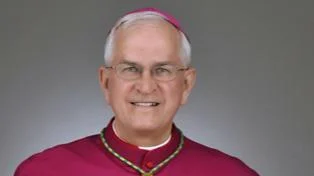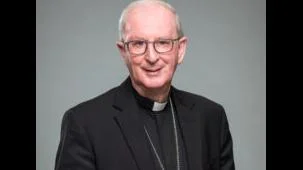
Reverend Joseph E. Kurtz, D.D. Bishop | Archdiocese of Louisville
Spending most of her life in Armentières, a small town in northern France bordering Belgium, Roseline Hamel, 84, did not expect such a dramatic turn when her brother, Jacques Hamel, 86, was murdered while celebrating Mass at his church in Saint-Etienne-du-Rouvray in Normandy on July 26, 2016.
Hamel found solace in forgiveness and friendship with the assassin’s mother. Together, they are now working on a book. Hamel was close to her brother and often visited him. The day before the attack, she arrived at the clergy house with her family to help him prepare for a vacation.
She recalled their last dinner together: “Just as we were about to start eating, much to our surprise, my brother put down his fork to speak to us. ‘I would like to tell you that I am infinitely happy to see you all here, around the table,’ he told us. We were amazed. He was not used to sharing his feelings like that.”
After the attack, Hamel locked herself in a "bubble of pain" for months. “I had to find a new path,” she said. A year later, she felt God’s presence in her suffering and thought of the murderers’ mothers.
Hamel sought out Aldjia Kermiche, mother of one of the attackers. She visited Kermiche with Archbishop Dominique Lebrun of Rouen. Before ringing the doorbell, they prayed a Hail Mary together.
“Kermiche immediately asked for my forgiveness,” Hamel said. “I replied that I had come to suggest that we try to manage our pain together.” They embraced and cried.
Adel Kermiche and Abdel-Malik Petitjean killed Father Hamel and injured another worshipper before being shot dead by police.
During their first meeting, Kermiche spoke about her son’s painful transformation under jihadist influence. “We deeply understood what she was saying,” Hamel said.
Hamel continued visiting Kermiche regularly. She noted similarities between their families despite religious differences. Both families valued stability and community involvement.
Kermiche described her son as sensitive but influenced by extremists online who convinced him their way of praying was correct and encouraged him to go to Syria. Despite attempts by his parents to intervene, he was radicalized during imprisonment for attempting to travel there.
Today, Kermiche continues teaching with support from colleagues despite fears of student reactions.
During the 2022 trial against four alleged accomplices in Father Hamel’s assassination, Hamel publicly comforted Kermiche: “I was not there to judge and condemn.”
Their friendship has since evolved into action. On January 25th, they attended the Jacques Hamel Prize ceremony at Lourdes for journalistic work on peace efforts and interreligious dialogue. Pope Francis praised Father Hamel as “kind” and “peaceful” against violence supposedly unleashed in God’s name.
The idea for their book emerged on All Saints’ Day in 2019 when Kermiche suggested it after taking Hamel to pray at her son’s grave.
Hamel previously wrote "Jacques, Mon Frère" ("Jacques, My Brother") about her brother whose beatification process is underway in Rome after Pope Francis recognized him as a martyr soon after his murder.
In December 2023, Hamel met Pope Francis and shared gifts including an Easter homily written by her brother among other writings sent for beatification proceedings.
Now focused on their joint book project with Kermiche titled "My Sister in Pain," Hamel aims to express mutual friendship and compassion as victims of terrorism: “In addition to the pain of losing her son," she concluded "Kermiche is carrying a heavy burden of guilt."




 Alerts Sign-up
Alerts Sign-up